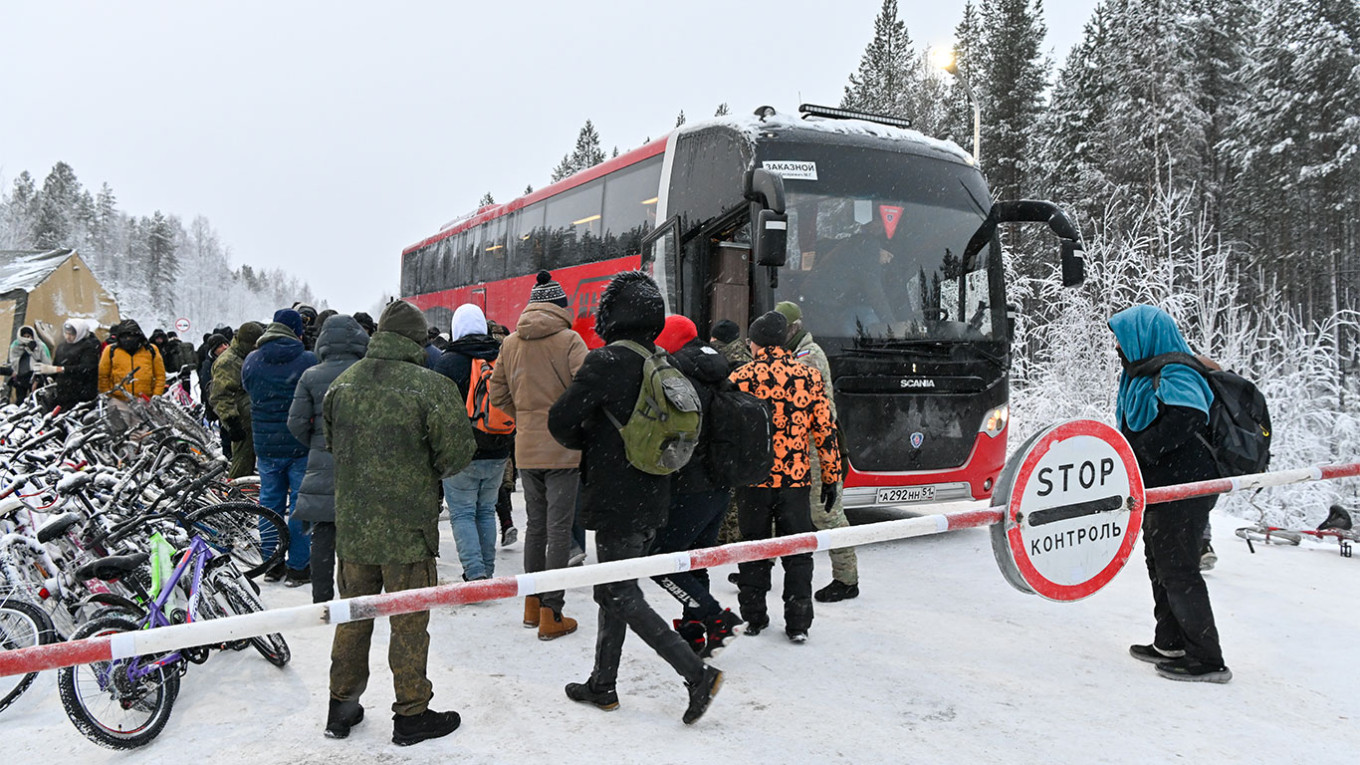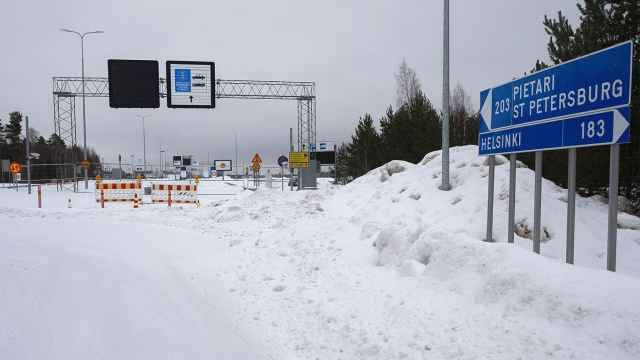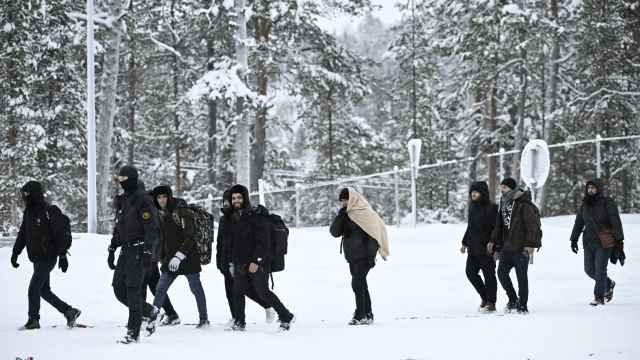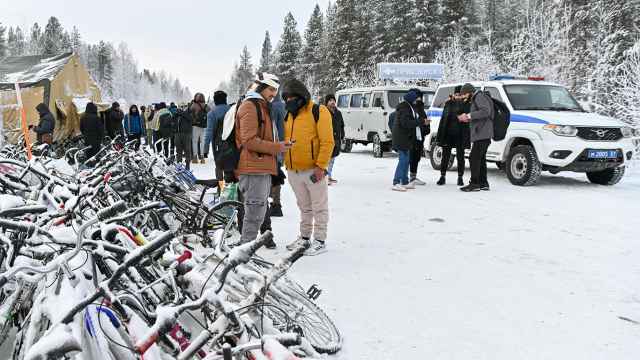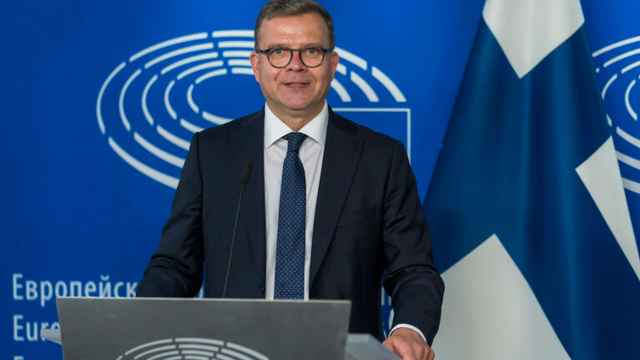Another migration crisis is rumbling on Europe’s borders. After a weeks-long trickle, the number of people trying to enter Finland and Estonia illegally suddenly spiked this month, prompting Finland to close its eastern border entirely. Blame has been placed squarely on one country’s shoulders: Russia.
Last week, Estonian Defense Minister Hanno Pevkur described a “fully state-orchestrated” operation by Moscow, which he said was weaponizing immigration. Latvia’s Defense Minister, Andris Sprūds, took it a step further, accusing President Vladimir Putin of acting as the “puppet master” behind it all.
The reasons why Moscow is doing this are clear. Amid soaring tensions with the West over Ukraine, it is delivering on its threat of retaliation against Finland for joining NATO, while Estonia is in the firing line for its staunch support of Kyiv. This looming instability on the EU’s eastern frontier will likely be felt in capitals across the continent, as well as in the European Parliament.
Russia’s strategy is to both overwhelm and destabilize its “unfriendly” neighbors. Pushing refugees and other vulnerable people to their borders heaps pressure on Finland and Estonia’s border forces, immigration systems and social services, straining their resources. Importantly, it could inflame social tensions. In Finland, where surging nativist sentiment has turned far-right politicians into power players in government, an influx of undocumented people from the Middle East and Africa could deepen polarization and political division — something Moscow would be eager to exploit.
This is not the first time Russia has resorted to such a harmful and unethical tactic. In 2016, Finnish officials accused Russian authorities of transporting 1,000 people to a border crossing in the Arctic, even providing hotel accommodation along the way. The event was widely considered Russia’s first, and most successful, hybrid attack of this kind on an EU member state to date — though Finnish politicians balked at calling it that at the time. Of course, despite its denials, Moscow is entirely to blame for this crisis. As it is impossible to enter Russia’s border zone without permission from the authorities, it is clearly no accident that hundreds of people have arrived at Finland’s doorstep on brand-new bicycles.
Such tactics speak volumes about how Russia’s leadership views people of color, who already face discrimination and racist violence inside the country. Indeed, it shows their callous disregard for human life and well-being in general and readiness to treat people as pawns in a geopolitical game, though the bloodshed in Ukraine already made this clear.
Despite the Kremlin’s weaponization of migration, we still cannot ignore the humanitarian dimension of this issue. Security concerns should not negate the fact that these are human beings often fleeing war, poverty and oppression. They are people with pasts, fears, hopes, families and dreams — just like you and me.
Right now the opposite is happening. Declaring that it was in a “hybrid war,” Finland dispatched its soldiers to its 1,300-kilometer border with Russia, hastily laying barbed wire and erecting concrete barriers. Europe’s border agency Frontex also beefed up its presence, deploying more guards and equipment. On Tuesday, Finland announced it would close the border entirely.
In the words of Pevkur last week: “These are not asylum seekers; this is weaponized illegal immigration.” Instead of people, they are weapons and tools to create chaos. Their humanity and basic needs for food, shelter or healthcare are disregarded — as are human rights or dignity.
This ignores that many people are duped into coming by unscrupulous smugglers promising quick and easy entry into the EU. Others are blinded by desperation, or simply unaware of what they are getting themselves into. Even if someone came for non-humanitarian reasons, when stranded on the border without money, food, or proper winter gear in a region famous for its bitter winters, they become akin to a refugee nonetheless.
Past examples show what could be in store. In what has been called “Europe’s forgotten migration crisis,” Belarus has been pushing people into Poland and Lithuania since 2021. Lithuanian authorities claim that Minsk sends people during the harsh winter months barefoot or without jackets to ramp up the pressure. Several have lost limbs to frostbite or died trying to cross into the EU.
And these are just the cases we know about. NGOs in Lithuania warn the cold, swampy border area is littered with the bodies of missing migrants. Their loved ones back home may never know what happened to them. There is now a risk these tragedies will be repeated.
Meanwhile, Helsinki has responded just as Moscow wanted. The more the tactic appears to ruffle feathers, the more powerful it is. It doesn’t matter that the numbers concerned — around 800 people since August — are comparatively very small. A rich country like Finland with a well-developed welfare state can handle it. What matters is putting up a strong show against Russia.
In turn, the spectacle of a securitized response and scuffles between migrants and Finnish border guards actually helps create and perpetuate the notion that these people are a security threat. Ordinary citizens will then believe that their country is under attack, and demand that their governments implement more violent and harsh measures at the border. In contrast, Ukrainians were largely welcomed with open arms. This shows the importance of government framing and policy in shaping public attitudes toward refugees.
With more countermeasures around the corner, Finland’s Interior Minister Mari Rantanen has vowed to ensure security “in all situations,” suggesting that protecting human rights is an afterthought. A sensible solution would be for Finland to cool its rhetoric, treat people humanely and process asylum applications quickly to show Moscow the resilience of Europe’s democratic systems.
Elsewhere in Europe, there are grim examples of what could happen if the opposite measures are carried out. Amid escalating tensions on its border, Lithuanian authorities have been widely accused of violently pushing people back into Belarus, while subjecting thousands to inhumane conditions and torture in detention camps. In January, Vilnius controversially legalized this pushback policy, allowing immediate expulsion without the right to claim asylum. The fact this violates international and EU law does not seem to matter.
Completely closing borders with Russia is unlikely to solve any of these problems. European governments must ensure they don't resort to the very policies antithetical human life and the laws designed to protect it that would put them closer to the very thing they are standing against — the Kremlin.
A Message from The Moscow Times:
Dear readers,
We are facing unprecedented challenges. Russia's Prosecutor General's Office has designated The Moscow Times as an "undesirable" organization, criminalizing our work and putting our staff at risk of prosecution. This follows our earlier unjust labeling as a "foreign agent."
These actions are direct attempts to silence independent journalism in Russia. The authorities claim our work "discredits the decisions of the Russian leadership." We see things differently: we strive to provide accurate, unbiased reporting on Russia.
We, the journalists of The Moscow Times, refuse to be silenced. But to continue our work, we need your help.
Your support, no matter how small, makes a world of difference. If you can, please support us monthly starting from just $2. It's quick to set up, and every contribution makes a significant impact.
By supporting The Moscow Times, you're defending open, independent journalism in the face of repression. Thank you for standing with us.
Remind me later.


